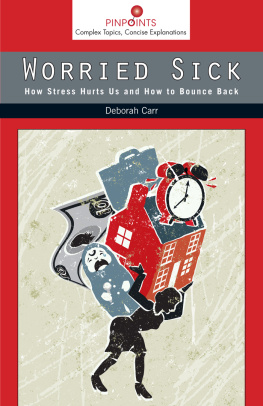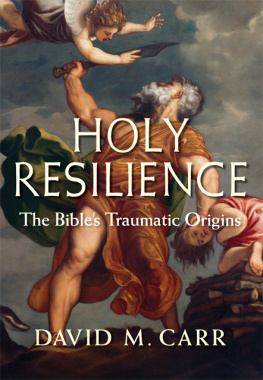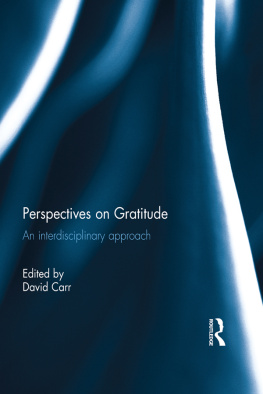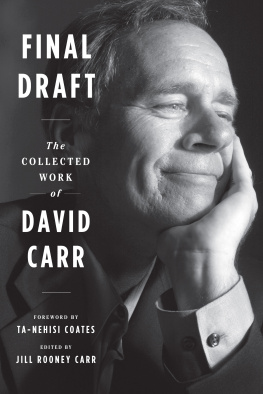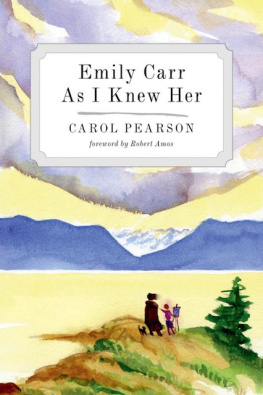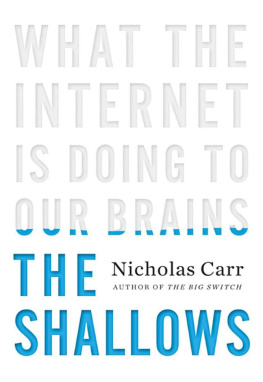Carr - Worried Sick
Here you can read online Carr - Worried Sick full text of the book (entire story) in english for free. Download pdf and epub, get meaning, cover and reviews about this ebook. year: 2014, publisher: Rutgers University Press, genre: Politics. Description of the work, (preface) as well as reviews are available. Best literature library LitArk.com created for fans of good reading and offers a wide selection of genres:
Romance novel
Science fiction
Adventure
Detective
Science
History
Home and family
Prose
Art
Politics
Computer
Non-fiction
Religion
Business
Children
Humor
Choose a favorite category and find really read worthwhile books. Enjoy immersion in the world of imagination, feel the emotions of the characters or learn something new for yourself, make an fascinating discovery.
Worried Sick: summary, description and annotation
We offer to read an annotation, description, summary or preface (depends on what the author of the book "Worried Sick" wrote himself). If you haven't found the necessary information about the book — write in the comments, we will try to find it.
Carr: author's other books
Who wrote Worried Sick? Find out the surname, the name of the author of the book and a list of all author's works by series.
Worried Sick — read online for free the complete book (whole text) full work
Below is the text of the book, divided by pages. System saving the place of the last page read, allows you to conveniently read the book "Worried Sick" online for free, without having to search again every time where you left off. Put a bookmark, and you can go to the page where you finished reading at any time.
Font size:
Interval:
Bookmark:
Worried Sick

Pinpoints is a series of concise books created to explore complex topics by explaining key theories, current scholarship, and important concepts in a brief, accessible style. Each Pinpoints book, in under 100 pages, enables readers to gain a working knowledge of essential topics quickly.
Written by leading Rutgers University faculty, the books showcase preeminent scholars from the humanities, social sciences, or sciences. Pinpoints books provide readers with access to world-class teaching and research faculty and offer a window to a broad range of subjects, for a wide circle of scholars, students, and nonspecialist general readers.
Rutgers University Press, through its groundbreaking Pinpoints series, brings affordable and quality educational opportunities to readers worldwide.
When complete, the series will comprise the following five volumes:
Deborah Carr, Worried Sick: How Stress Hurts Us and How to Bounce Back
Nicole Fleetwood, On Racial Icons: Blackness and Public Imagination
James W. Hughes and Joseph J. Seneca, Dynamics of the New Jersey Economy: A Long-Term Perspective
Toby C. Jones, Running Dry: Essays on Water and Environmental Crisis
Charles Keeton, A Ray of Light in Sea of Dark Matter
Worried Sick
How Stress Hurts Us and How to Bounce Back
Deborah Carr
Rutgers University Press
New Brunswick, New Jersey, and London
Library of Congress Control Number: 2013951982
ISBN: 978-0-8135-6535-4
Copyright 2014 by Deborah Carr
All rights reserved
No part of this book may be reproduced or utilized in any form or by any means, electronic or mechanical, or by any information storage and retrieval system, without written permission from the publisher. Please contact Rutgers University Press, 106 Somerset Street, New Brunswick, NJ 08901. The only exception to this prohibition is fair use as defined by U.S. copyright law.
Visit our website: http://rutgerspress.rutgers.edu
Manufactured in the United States of America
Contents
- Naomi, a fifty-nine-year-old mother of five grown children, spent ten difficult years caring for her husband, Raymond, who was slowly dying from chronic liver disease. At the same time, Naomi worried about her mother, Marguerite, who was in the final stages of congestive heart failure and dementia. Just months after Ray and Marguerite died, Naomi suffered a transient ischemic attack (TIA) or mini-stroke.
- Rob, a forty-seven-year-old copy machine repairman, was one of millions of Americans who lost his job during the recent recession. He went back to school for an associates degree in computer science, developed new skills, and searched high and low for a new jobto no avail. After more than a year of fruitless job hunting, Rob shot and killed himself, leaving behind his devastated wife and teenage daughter.
- Marisol is a twenty-year-old dynamo who attends college full time, volunteers as a translator at her local hospital, works thirty-five hours each week at a fast-food restaurant to earn tuition money, and helps her single mother care for two younger sisters. An A- student majoring in Spanish and biology, Marisol was so run down by the end of the semester that she fell sick with the flu, and had to take incompletes in two of her courses. She is worried that her grades may suffer, and that she wont be accepted into medical school.
We all know a Naomi, Rob, or Marisol. Each of us has witnessed a friend, coworker, or family member who tried to do it all, yet ended up exhausted, sick, or depressed. Maybe youve faced your own struggles, whether a divorce, a bankruptcy, or a troubled relationship that pushed you to drink more than you usually would. Maybe you have a stressful job, and try to calm your nerves by smoking cigarettes or eating your favorite comfort foods. That stressorslarge and smallaffect our health is a truism. Laments like Im worried sick convey the conventional wisdom that being stressed out will harm our health. Literally thousands of academic studies reveal that stressful life events (such as a job loss), ongoing strains (such as burdensome caregiving duties), and even daily hassles (such as persistent traffic jams on the commute to work) affect nearly all aspects of our physical and emotional well-being.
Yet we have all experienced stressful timesmaybe a major work deadline, or relocating cross-country for a new jobwhen we came out unscathed, feeling not only emotionally and physically healthy, but better than we did prior to the crisis. This experience is not unique; dozens of academic studies also provide support for the rallying cry that which doesnt kill us makes us stronger, which suggests that we may grow more resilient and resourceful with every challenge. But how can stress be a source of both compromised health and resilience? And why do some people withstand tremendous adversity without a scratch, while others fall ill or become emotionally despondent when faced with even a seemingly minor hassle?
Worried Sick answers these and other questions about how stress makes us sick and depressed and even shortens our life spans. I will also show how and why some people are resilient and seemingly immune to such health woeseven in the face of unimaginable stress. Figuring out our own sources of strength and vulnerability is an important step toward developing personal strategies to minimize stress and its unhealthy consequences. Yet I will also challenge the notion that merely reducing stress in our livesdoing deep-breathing exercises or venting to our best friendwill help us to stay healthy despite our increasingly hectic lives as workers, parents, students, and caregivers. By focusing on repairing the stressors in our lives and trying to find quick-fix solutions (a good babysitter, a new job, an antidepressant), were missing the larger picture. Many of the stressors that we face in everyday life are not our problems alone; rather, they are symptoms of much larger, sweeping problems in contemporary U.S. society.
For instance, what might have benefited Rob most? A visit with a therapist? A prescription for an antidepressant? An economy that provided full-time jobs with benefits to all qualified workers? A culture that encouraged men to talk about their fears and insecurities, rather than keeping their feelings bottled up? And while Marisols college advisor told her to get more sleep and attend stress-reduction workshops at her university health center, might a better solution have been programs to help first-generation college students to fund their education? Although the self-help guides lining the shelves of bookstores give us tips on how to manage our stress, and prescription medications to cure our anxiety are just a doctors visit away, more sweeping solutions may be necessary.
Overview of Chapters
The following chapters delve into the concept of stress: defining what it is; explaining how it affects our emotional and physical health; identifying the biological, psychological, and economic factors that protect against (or exacerbate) the consequences of stress; and showing what can be done to minimize its impact on our everyday lives. In this first chapter, I provide a brief overview of the history and concept of stress, and describe the diverse forms that stress may take. Although we often use the term stress as a catch-all to describe the many nerve-jangling experiences in life, we will see that stress can take many forms: stressful events, such as a house fire or job loss; chronic stressors that persist over time, such as marital conflict or a long-term illness; daily hassles, such as traffic jams or a misbehaving pet; and network events, or those stressors bedeviling others that may affect us, such as a spouses work troubles or a childs difficulties at school. I also show how stress exposure varies based our personal characteristics, including gender, race, age, and social class.
Font size:
Interval:
Bookmark:
Similar books «Worried Sick»
Look at similar books to Worried Sick. We have selected literature similar in name and meaning in the hope of providing readers with more options to find new, interesting, not yet read works.
Discussion, reviews of the book Worried Sick and just readers' own opinions. Leave your comments, write what you think about the work, its meaning or the main characters. Specify what exactly you liked and what you didn't like, and why you think so.

